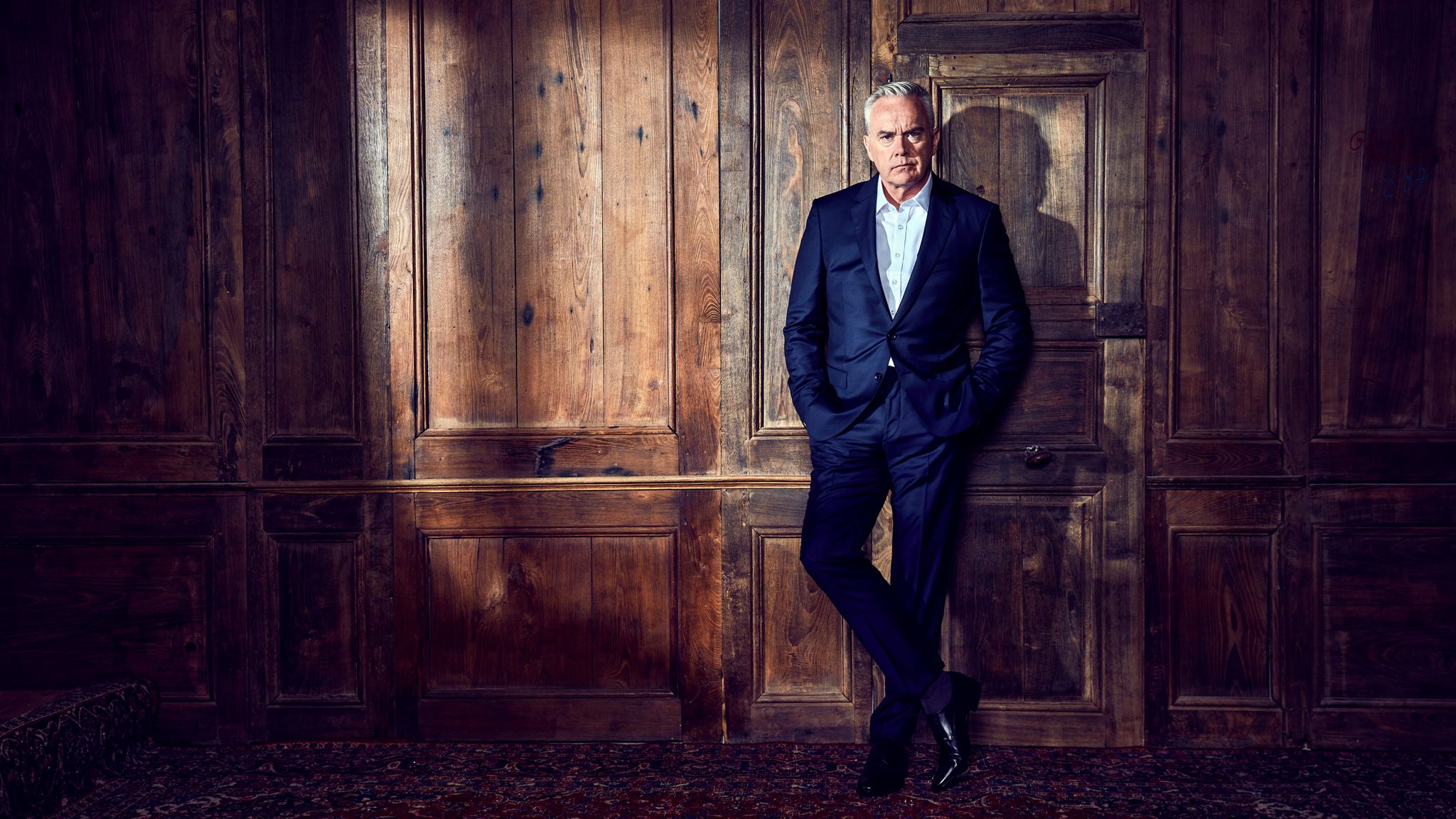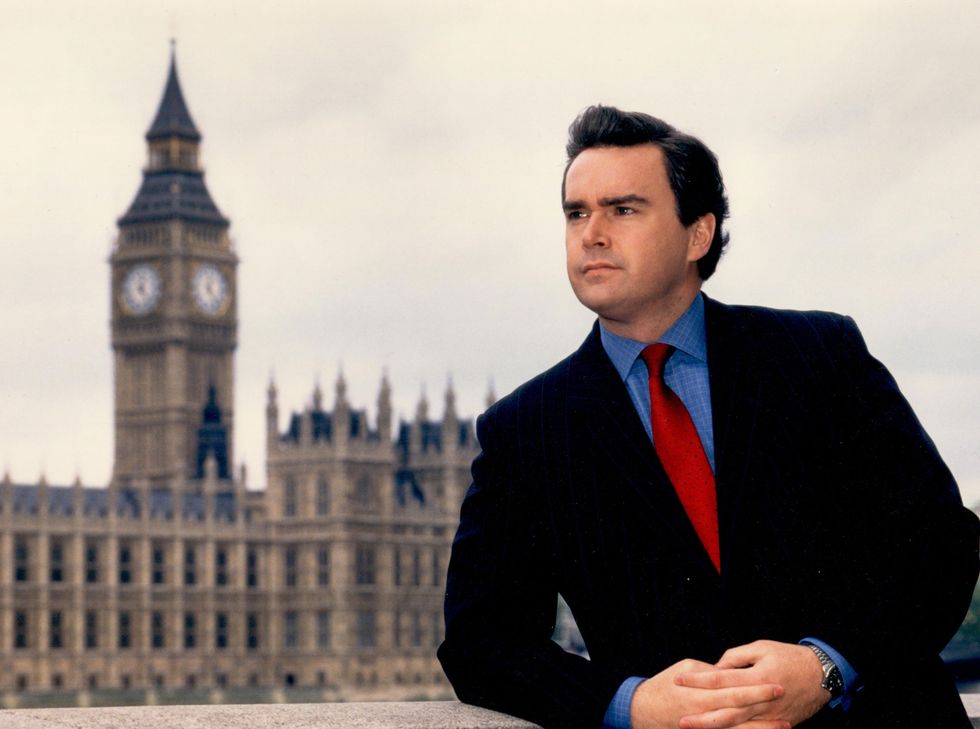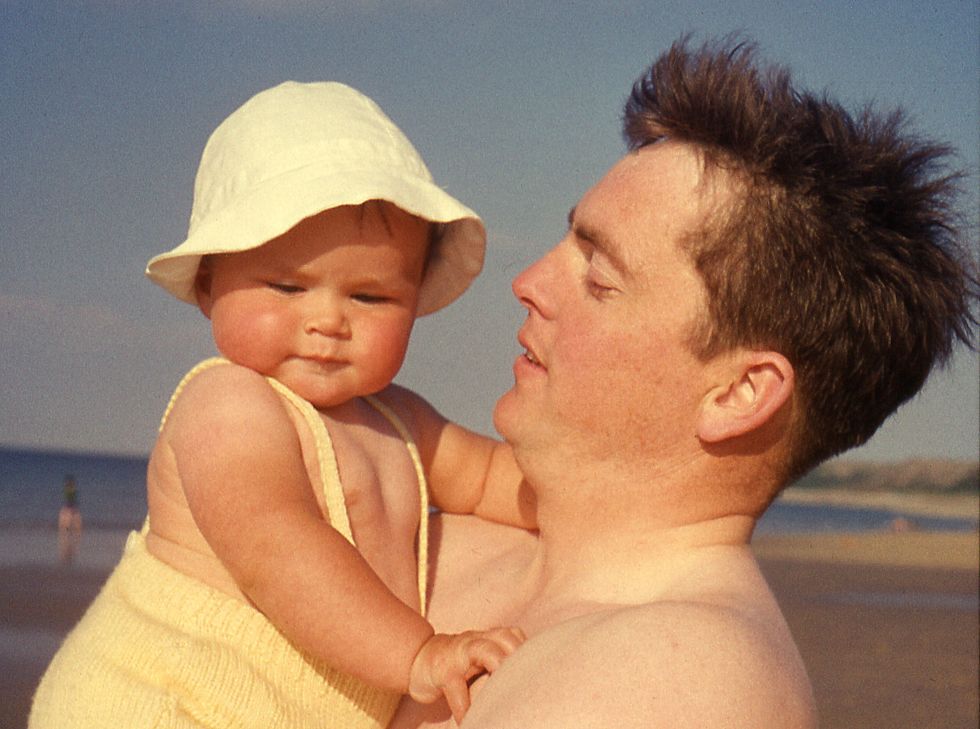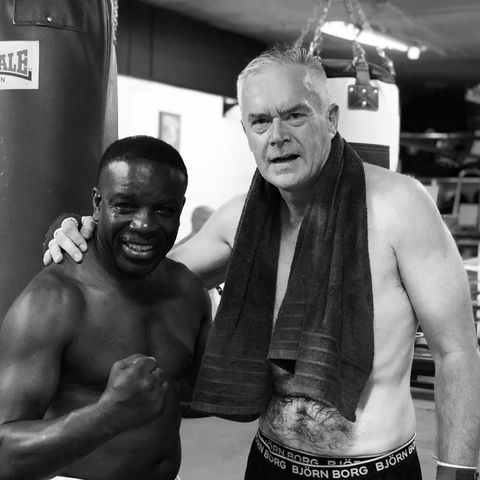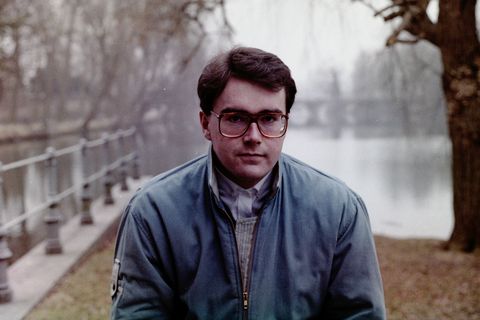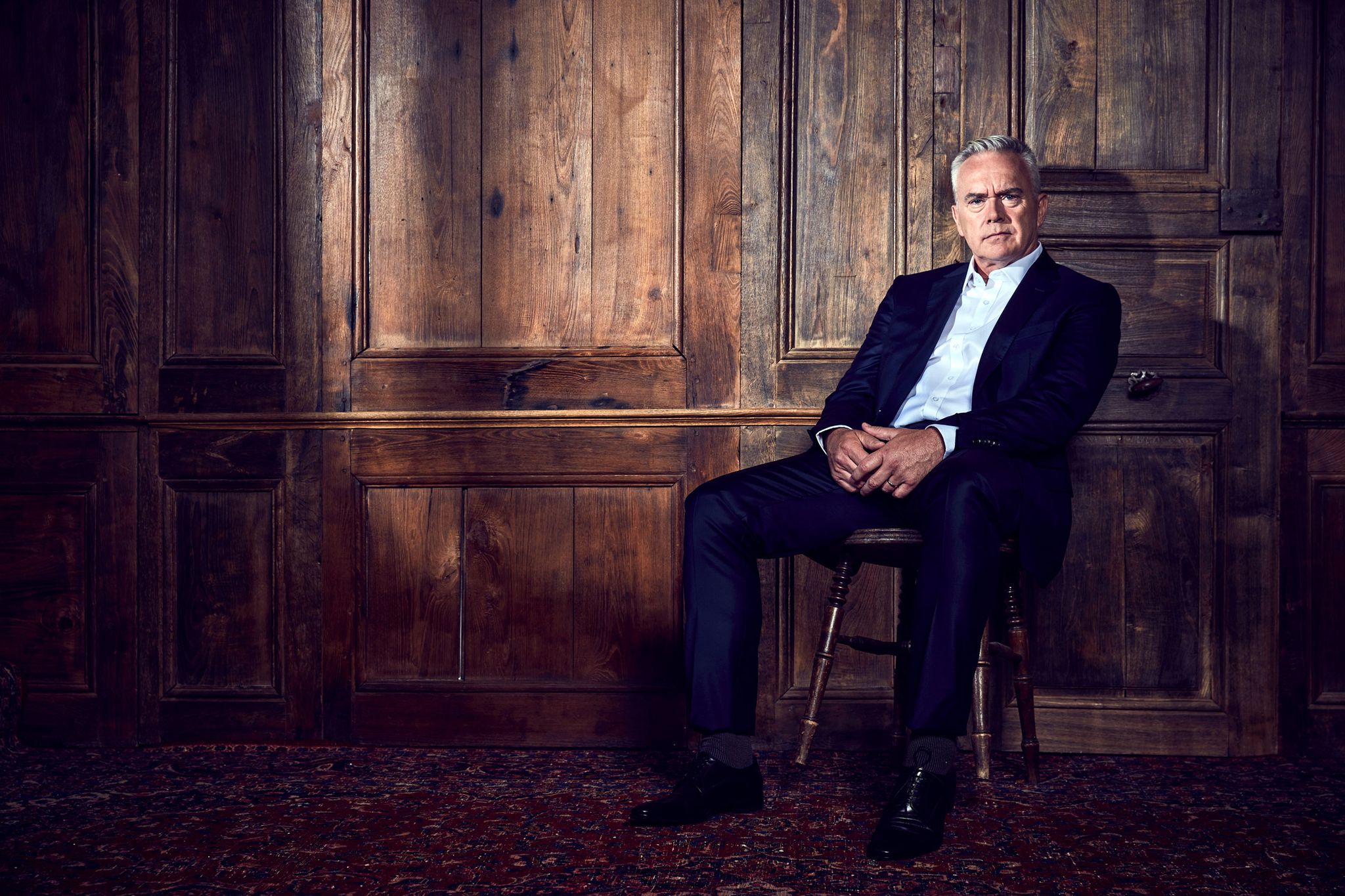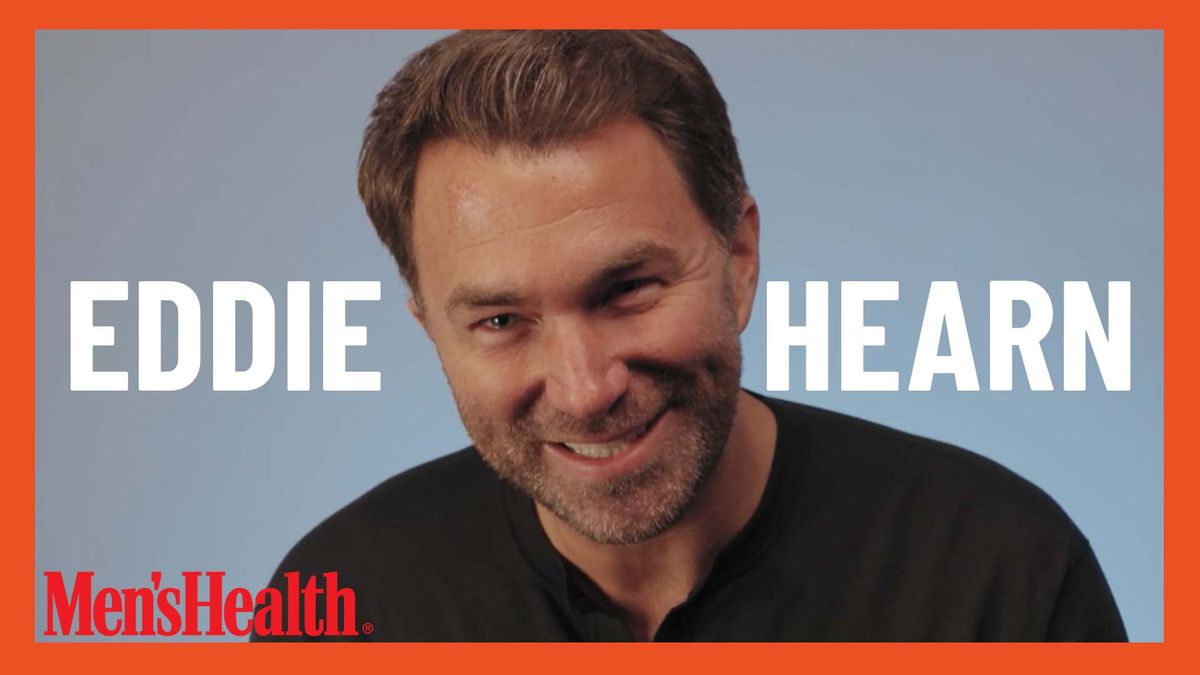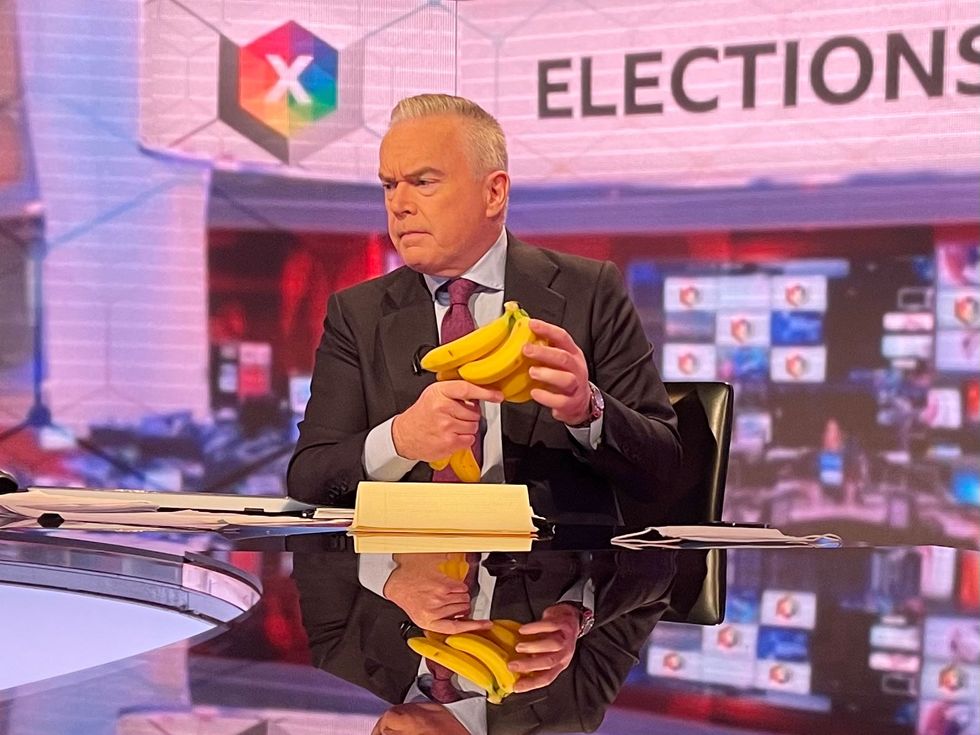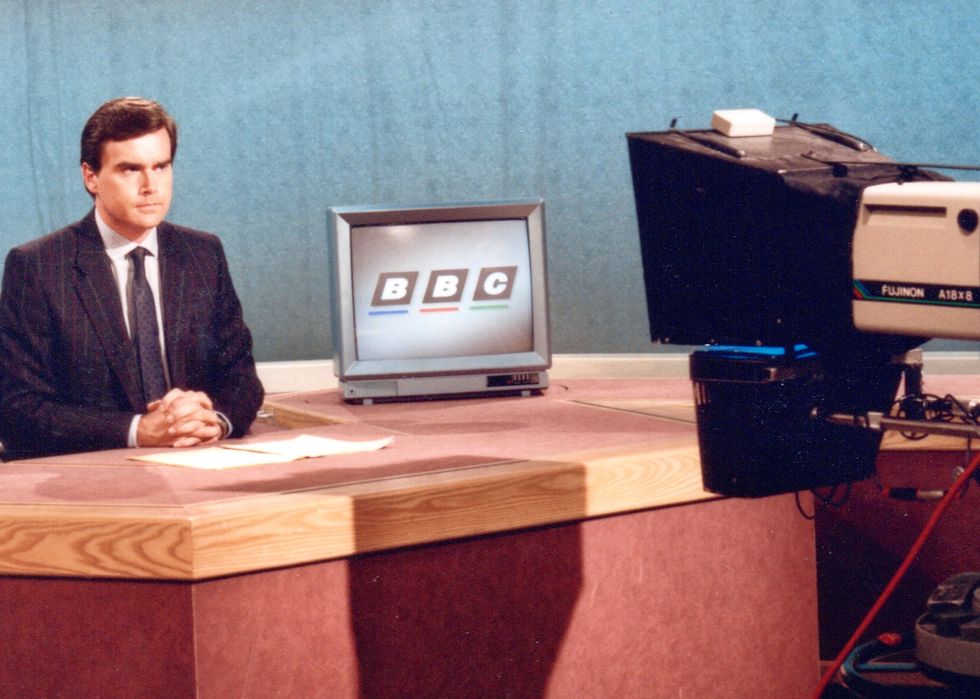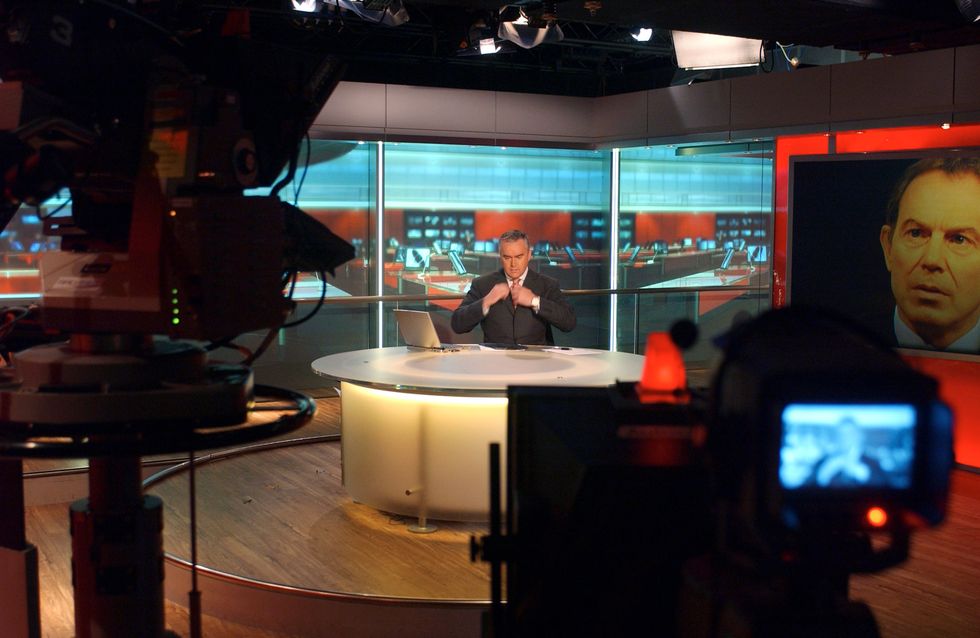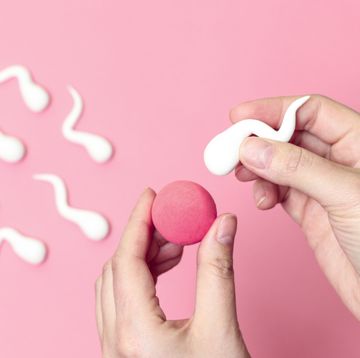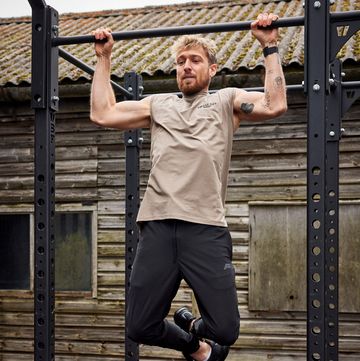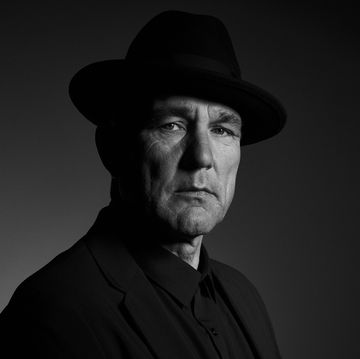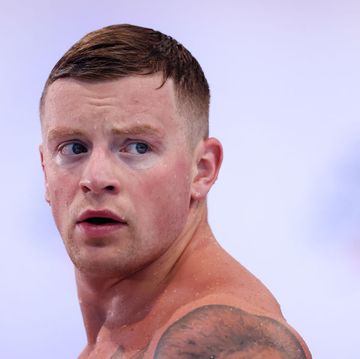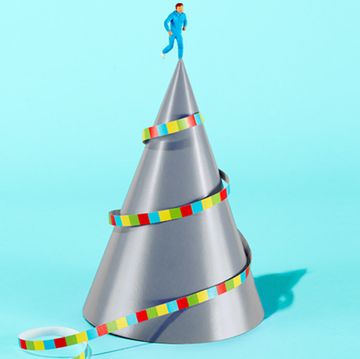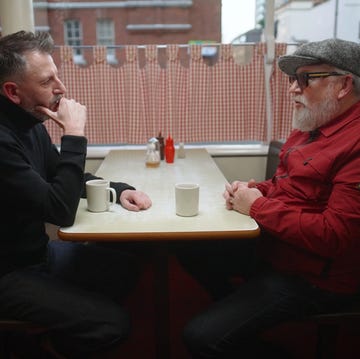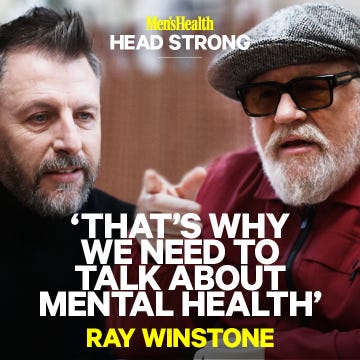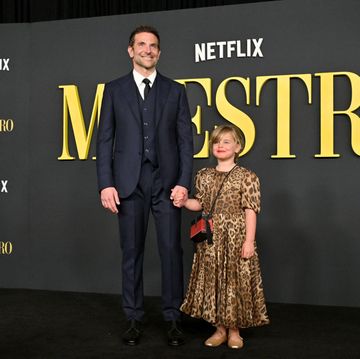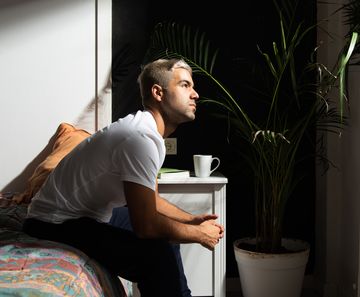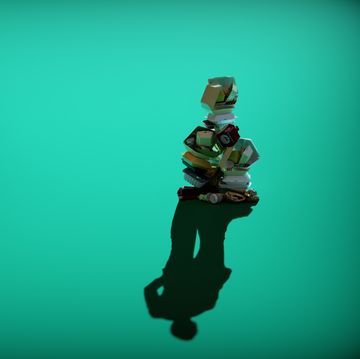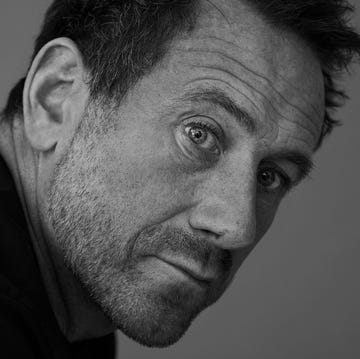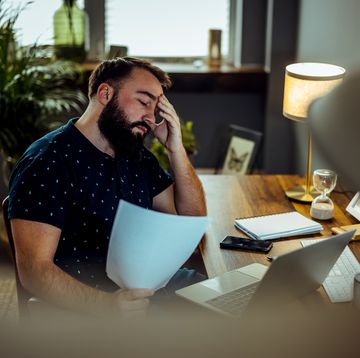Alastair Campbell: Can we start with the depression? How often? How bad? How recent?
Huw Edwards: I read your Men’s Health interview with Seb Coe and it was interesting because he said the ups and downs of life can’t really be classed as depression. I’m pretty clear that I have suffered – and do suffer – from depression. It’s not anxiety, although it includes anxiety, but it tends to hit me in a strong wave and then go away.
AC: And does it last for hours? Days? Weeks?
HE: Oh, weeks. I think at least I now know when I’m going to enter a phase like that. Your mind goes into a place where you don’t want to do anything. You can’t make any decisions. Things that you usually enjoy, you dread. You come into work and obviously you do a professional job, but you’re kind of pushing your way through it. And, of course, if it’s very bad – as it has been a few times over the course of 20 years – you can’t work. During the worst one I had, I couldn’t get out of bed.
AC: How long did that go on for?
HE: It’s not that I was in bed for days on end. The whole process of struggling to get out of bed is probably a better way of putting it. For weeks, I’d struggle. And basically, I needed Vicky [Edwards’ wife] telling me, ‘You need to get up, go and get a coffee, don’t talk to anyone if you don’t want to, but just go for a walk.’ We have a dog now. Pets are a boon. For anyone who suffers with anxiety or depression, if you want to communicate in a way that’s actually quite rewarding and not stressful, a pet is ideal.
AC: I find my dog knows when I’m depressed.
HE: If I go into our front room and read by myself, that’s quite a bad sign. That’s me shutting off. And Mot will come and sit at my feet.
AC: Do you see someone and take medication?
HE: I have seen someone in the past. And I have taken antidepressants in the past. Not now. I’d happily take them again if I needed to – I don’t have a problem saying that.
AC: When was the last time you were on them?
HE: 2019. That was my last big downer.
AC: Did you share it with anyone?
HE: Vicky. She would know anyway. And my mum. I think my dad… This is the irony. I look back and I can see now that he suffered from depression, but he never recognised it. And he, in fact, was very impatient with people who said they were depressed. Almost angry, you know? ‘Self-indulgent crap,’ he once called it. His general theme was that there are people with real problems in this world...
AC: I sort of get the sentiment. I’ve been depressed recently, but then I look at the suffering in Ukraine and I feel guilty about feeling the way I do.
HE: I completely get the sentiment. I say it to myself sometimes: ‘What the bloody hell are you obsessing with yourself for?’ The episode in 2019 came after a big D-Day anniversary event in Portsmouth. I got home and I think I slept for something like 18 hours. When I woke up, I knew something had happened. Vicky thought it was perhaps overwork, but I couldn’t quite put my finger on it. And then I thought: ‘Oh. Maybe you do need a bit of help here.’
AC: So 2019 was the last really bad episode?
HE: Yeah. I’ve had a few ‘I wonder what’s going on’ times, but it’s not gone there. I came off antidepressants at the end of 2019.
AC: Which ones were you on?
HE: Venlafaxine. I found them very good.
AC: I always had a sense about you that there was something going on.
HE: I think there’s a radar for people with depression. You realise that someone’s maybe a bit fragile, a bit vulnerable.
AC: Do you have suicidal thoughts?
HE: I’ve never had suicidal thoughts. Never. The worst I’ve thought is, ‘What’s the bloody point of being on this bloody treadmill if I feel like this?’
AC: But you don’t feel your life is worthless?
HE: I’ve never felt my life is worthless. Other people who get depression will feel differently about this, but I think once we had kids, for me, it acted as a block. I think I can never go there because, bloody hell, think about the damage you’d cause.
AC: How important is your boxing?
HE: It’s one of the things I can do when I feel myself on the slide. I can pull my way out of it. I go to see Clinton [McKenzie, former boxer] in the gym. He’s brilliant and he understands – he’s got a son who’s had depression, so he understands this stuff.
AC: Were you not really into fitness until then?
HE: No.
AC: Would you say you’re obsessed with it now?
HE: Not at all. I’d say that in 2018, when I lost a lot of weight, I became slightly obsessed – and the whole kind of image thing. But it’s tiresome. The main thing is not whether you look good, but whether you feel good.
AC: Were you thinking in those terms though?
HE: Oh God, yeah! I thought I looked much better. I looked much slimmer. And, actually, that felt quite good at the time. People were remarking on it, which, you know, is a nice thing. But ultimately you realise that unless you’re feeling good about yourself, it doesn’t matter how nice your suit is and how well it fits you.
AC: Do you have an open conversation with your kids about your mental health?
HE: Relatively open, yes. You know, my packet of antidepressants is there on the kitchen unit. I don’t hide it. They accept it’s just part of who I am. And that’s been great. It’s been very rewarding. Vicky’s incredibly easy-going, very sympathetic. She’s supportive when she needs to be, she steps back when she needs to. The kids have different views on it. One of my girls will come to me and ask how I’m feeling. She’s got a code – she’ll say: ‘How are you upstairs today?’ And I think, for a 20-year-old, that’s a nice thing to be asked.
AC: What about your relationship with your dad? Do you think that’s where a lot of it stems from?
HE: Well, actually, at the end of his life [Hywel Teifi Edwards died in 2010] we got on very well and I’d say we were quite close. And that certainly hadn’t been the case when I was growing up. It’s difficult to explain in England, but my dad was a very public figure in Wales. I’ve often wondered what would have happened if he’d won a seat in Carmarthen for Plaid Cymru – he came very close twice. As a performer in the Commons he would have been great. But he was absent most of the time when I was growing up. He was either doing his night classes or he was lecturing all over Wales. So if he was home, he was in his study writing books. When we did see him, he tended to be unbelievably tired and ratty. So it wasn’t a great combination. He could lose it sometimes.
AC: Did you feel the need, before he died, to get that closeness? Who worked at that?
HE: I made all the approaches and he responded very well. I felt he was glad I made the approaches.
AC: Were you clear with him that it had been a troubled relationship?
HE: I didn’t need to be because he said it himself. The most difficult time was when I had to tell him he was dying. That there was no return.
AC: Because the doctor had told you?
HE: The doctor told me and I told him. And then it’s strange, isn’t it, because literally within an hour he was saying things like, ‘I’m very proud of you and your sister… I wish I’d spent more time with you growing up… I don’t think I was the best dad.’ And I told him, ‘Forget it. It’s all done. The important thing is we get on now – we love each other and we get on.’ I felt that was a very important thing to say. And I could tell he was moved by it and actually very relieved by it. He told my sister that he was incredibly grateful that I’d been there when this news came in.
AC: But you’d had depression before that? So it’s not just been about grief?
HE: You know, traditionally the Welsh have made a bit of a fetish out of funerals and grief. I had to organise the funeral. And, of course, half of Wales turned up. Which is exactly what he wanted. So the reason I’m saying that is because lots of things are suppressed when you’re doing that stuff. You park a lot of your feelings. You get back into work, you’ve got five kids, and the whole thing takes over again. And then, of course, it just takes a bit of a trigger. Suddenly your mind goes back to it and you realise that actually you haven’t spent any time properly processing what happened. And I still don’t think I have, to be honest. So when you say depression started before him – of course it did. But I’ve no doubt that the failure to properly process all of the stuff that was churned up – most of your childhood – fed into an element of volatility.
AC: Do you find your mental state affected by your work?
HE: Broadcasting news, actually preparing The Ten, writing the headlines, arguing about the running order… I love doing that. That’s never changed.
AC: And the big live events?
HE: Fantastic. It’s where the shackles come off, in a way. Because you’re in a studio, nothing’s scripted, you go with it, and you ask the questions you want to ask. You follow the lines that you want to follow. In many ways, it’s a much more rewarding thing than presenting The Ten. Because The Ten is a straitjacket. Most of the work happens before I’m even on screen. People don’t get that. The BBC News Channel is much more of a journalistic activity.
AC: Say you suddenly get a message that the Queen’s died. Are you reacting as a human being? Or is your reaction more about realising that it’s one of the biggest things you’re ever going to have to do?
HE: It’s going to be a reaction that says: ‘The BBC’s really got to get this right.’ And that will involve reflecting that people will be, in many cases, extremely sad and that they will feel an appropriate tribute has to be paid and done in the right way. And the word that everyone’s obsessed with then is tone. You have to get the tone right – and in many cases it’s not an obvious thing to get right. It’s easy to slip in a word or a phrase that’s not meant in an offensive way but kicks off.
AC: With Prince Philip’s death, did you think you got the tone right?
HE: I was probably happier with that than most things I’ve done in my career. And the response to it was quite telling. It was ‘the BBC at its best’. The truth is I’ve prepped for these things. I put a lot of work into the Philip scenario years before he died, thinking about whether I’m going to do the breaking news. I came into work that day and it happened within 40 minutes. What do I want to say? What questions do I want to ask? What about all that stuff about him being a controversial figure and saying very unfortunate things – am I going to ignore that? Am I going to offend people if I bring that up? So you have to do it in a way that’s respectful.
AC: How much thinking and preparation have you done about the Queen’s death?
HE: A huge amount.
AC: Active? Practising?
HE: Yes, at home.
AC: Just on your own?
HE: The Queen’s death will be the biggest thing the BBC’s ever done. Because of what she represents as an individual. And what she represents as continuity for other people. Of course, the coronation’s important – of course it is. But we’ll be closing the book on the longest reign in British history. And I think it will be the biggest ever test of what the BBC’s about. That includes things like elections and the 2012 Olympic Games, which I thought the BBC did absolutely brilliantly. I also think people will be slightly taken by surprise by the reaction to it.
AC: Do you still get adrenaline through news?
HE: I get a little bit of adrenaline every time the red light comes on. And I think it’s quite dangerous if that doesn’t happen. But on an event like that your burst of adrenaline will be significantly bigger. I will be so obsessed with trying not to put a foot wrong that I’ll be in very cautious mode. Your job – because everyone on set can hear you from the presenter’s mic – is to stay very calm. Because if you start to get a bit agitated or get a bit angry about stuff that’s not happening – and I’ve seen this happen – you can spread anxiety around the team like wildfire. On that day, whenever it is, it’s going to be a story on a dimension we’ve not seen before.
AC: How do you feel about the political situation the BBC’s in and the attacks that are made upon it?
HE: You have to accept in this day and age that you’re not going to get a fair crack in the press. Even if you do a great job, you’re still going to get some carping nonsense from someone who’s never done anything like it themselves. It took me a long time to get used to that.
AC: But there’s now a political dimension to it, in that you’ve got a government that’s actually got you in its sights.
HE: Totally. I’ll come back to that. But when I think back 20 years to me getting The Ten job, it took a long time to stop having a thin skin about people having a pop. ‘Why is this Welsh guy doing the news? Why doesn’t he sod off back to Cardiff and do the news there? All he does is read an autocue! Get rid of him!’ You can laugh it off but if it’s every bloody week. I wasn’t used to it. I was used to being told I was brilliant. My mistake was thinking you can please all of the people. And you can’t. You have to be grown up enough to just accept that.
AC: And what about the capital-P Politics?
HE: I see a broader arc. I tend not to get dragged into what’s happening at any particular time. We’ve had lots of different contentions with different secretaries of state, we had troubles with Labour when Labour were in power, and I see it as part of the cut and thrust of where we are in public service. And – especially with politicians who actively oppose the licence fee – you’re going to be in the firing line.
AC: That’s a new thing though, isn’t it? We never opposed the licence fee.
HE: I can see the arguments against the licence fee. But I’m yet to see an argument for a system that would – and this is crucial – sustain the BBC in its full public-service remit. Because subscription doesn’t do that. And even Conservative MPs who don’t like the licence fee admit that.
AC: But do you think people round the place feel more vulnerable than they did before?
HE: Well, look, you and I have known each other for a long time, and I like to think of us as friends. We felt very vulnerable when the whole David Kelly thing happened. We felt massively vulnerable and under threat. So my answer to you is that this is not new, okay? It’s not new to have friction with governments.
AC: I do think…
HE: I know what you’re going to say. You’re going to say that was triggered by one thing and this is more philosophical. There may be something in that.
AC: We still believed in the BBC and its core.
HE: It’s true – although that was difficult to square at the time with some of the aggression around it. It was a very unhappy patch. But you’re right, that was to do with one thing. This is about the perception of what public service broadcasting should be. I believe – and [BBC director general] Tim Davie believes – it’s up to us to make a case about the BBC’s place in public life. I have no doubt that the majority of the British public support the BBC in its current form. My mum tells me the licence fee is expensive for some people – and she’s right. Although I point out to her that she’s still paying £40 a month for Sky! But I do think we’re sometimes not robust enough in our arguments – and I hope Tim won’t be upset by me saying this. If there are complaints about the way we go about things, of course we’ll listen. But the principle of what we’re about – and the way that current funding enables that – is something I’m always pretty assertive in defending. I’ll say this just as an aside: on the day that [culture secretary] Nadine Dorries made remarks about abolishing the licence fee, I was receiving texts from senior Tories saying, ‘Don’t listen to that, it’s nonsense.’
AC: Do you feel confident about a future with the BBC?
HE: For as long as a strong majority of the public values the BBC. And by value I mean accesses our services. The fact that The Ten is reaching millions and millions of eyeballs a week in the UK – that’s access. No other broadcaster can say that in terms of news. So if we can show that people are accessing services at a massive scale every week, I feel we have a very solid case to make about the BBC’s future and we can feel hopeful about it. The problem is entertainment and competition from other channels. Like Netflix, which obviously isn’t investing in a news service. You know, what’s Netflix got to say about what’s happening in Ukraine this week? And yet the price of Netflix isn’t much different to the licence fee. We need to be saying these things more robustly. Not aggressively – you know me! [laughs] – I wouldn’t go on the attack. But I do think it’s right to say, before we go any further, can we just consider what we are supplying? And if you want to come to us and say that 45p a day, or whatever it is, is too much for everything the BBC provides – well, you can say that, but I might disagree with that view.
AC: Do you ever find it frustrating that you’ve had to deny yourself and your politics because you work for the BBC?
HE: Have I felt at times immensely frustrated? Yes. Do I feel very strongly about certain things? Yes. Have I got strong views on certain areas of policy? Yes. Where have I been able to share those views? Well, much to the BBC’s displeasure, in one or two instances when I’ve said things about protecting Welsh culture. They hinted that there was maybe a problem with impartiality. But my response was that this is an organisation that prides itself on protecting and promoting diversity and minority cultures – and Wales is one ofthem and it’s on your doorstep. So I’m only doing what you say is important!
AC: But that goes back to not being robust about defending yourselves.
HE: Exactly. So Tim will come in with a big impartiality drive. And when we first spoke about that I said you can’t be in a position where you have presenters using the platform to promote their own views in any way. But equally it can’t be some sort of gagging clause. Because there are some things you can talk about which aren’t to do with impartiality. They might be areas of personal interest or your background – in my case, Wales. Without sounding like a pompous fool, people actually expect me to comment – I’m seen as a major figure in Wales, rightly or wrongly – and they expect me to have something to say about it. It’s not a party-political thing in any way. It’s to do with my view on where Welsh society is going. Or even where Welsh governance is going. For me, that’s not to do with impartiality.
AC: If you had to list all the aspects of your national identity, how would you order them?
HE: I would say I’m Welsh first and I’m British and European in joint second. I don’t think that’s an unreasonable answer.
AC: So you’re a Plaid anti-Brexiteer?
HE: I’m a Welshman who’s treading a very high tightrope, okay? [Laughter]
AC: So how long are you going to do this for then? This coming in and reading the news?
HE: The obvious answer is that it’s entirely down to the BBC. I mean I could decide to leave – but I’m still here, aren’t I? I’m still enjoying The Ten. But after 20 years of it I don’t think it’s a shock to say that I might want a change. Or that the BBC, in fairness, might want a change. Or that the viewers, in fairness, might want a change! The crucial thing is I want to be broadcasting. I want to be doing the big events and the BBC seems keen for me to keep doing that. So the question is: if you’re not doing The Ten, what else do you do?
AC: As a journalist your great love was always the political stuff. You’ve got a big profile, particularly in Wales. You are very, very Welsh, and very interested in Welsh life and Welsh culture. So that suggests to me that your dad would be very proud of you if you said: ‘D’you know what? I’ve done this journalism lark, I’ll go and do politics in Wales.’
HE: I think it’s too late for me.
AC: Seriously?
HE: Yeah, I do. If you go back over 38 years, I’ve been asked by Labour, the Conservatives, Lib Dem and Plaid if I’d like to stand for them in some capacity. That proves I’m pretty damn balanced. And the truth is, of course, lots of my colleagues in journalism in Westminster think about it. Lots of them even did it – some of them better than others. But having seen the life of an ordinary backbencher – if there is such a thing as an ordinary backbencher – I was slightly worried that it wouldn’t be satisfying. Then the other thing for me is that I felt, as a prominent journalist in politics and elsewhere, I could possibly have a bigger contribution to make in some way – without sounding stupidly inflated about it. If you’re broadcasting to a large platform every day, that’s a big contribution you’re making to the day’s news agenda.
AC: But the day’s news agenda is being shaped by others…
HE: Partly, yes, but your job in any day is to decide what you’re going to cover, so it’s not straightforward. And certainly with election programmes, for example, you do feel that you’re part of an event. You’re not just covering an event – people are watching you to give them the result of the event. Giving the exit poll at 10 o’clock is a huge buzz. As is realising that they’re waiting for you to declare the result and say what’s going to happen next. So there’s a real sense of professional satisfaction in being trusted by people – because
it is about that – to give them a fair account of what’s going on. I can’t tell you how much that means.
AC: You’re not too old.
HE: I’m 60. Look, can I put it this way? Would I like to do something of service to Wales in future? Yes. What is that? I honestly don’t know. So am I likely to be standing in an election somewhere? It’s highly unlikely.
AC: But not impossible?
HE: I can’t see it happening. I just don’t think the circumstances are right. But do I have enough petrol in the tank to do something quite big or something with impact? Yes. Education for example – I’d be very keen to do something there. Not exclusively that, necessarily. But would I like to do something that is of more specific service? Yes, I would.
AC: So how come you’ve survived so long at the BBC?
HE: It’s not an easy place to navigate. And it’s not an easy place to survive in because there are constant changes in management and leadership. You will come across some who are very supportive and some who are overtly hostile. In the cases of people who have come from outside, that’s been a more difficult relationship. The fact is that no one coming from the outside quite gets how the BBC works at first.
AC: It is a very political organisation.
HE: Oh, totally.
AC: Are you quite cutthroat yourself?
HE: I’ve always been – I wouldn’t be here otherwise. You have to fight for survival sometimes. It’s a bit of a balance and I take very seriously the idea that I should be sharing experiences and skills with younger people. Very few people did it with me and I feel I should. The problem arises, of course, when the wind’s blowing in a different direction and you think, ‘Okay, can I get into a position where I’m with the wind? Or do I have to build a wall so the wind doesn’t come towards me?’
AC: This is why you have to go into politics!
HE: Well, it’s true! I mean, you’d love it here.
AC: I’m not sure they’d have me…
HE: Maybe they wouldn’t – who knows? But the fact is this place works as a semi-bureaucracy and it’s got all kinds of interest groups. I’m not saying that we don’t all share a view of what the BBC should be and that it should be good and a beacon of excellence. We all agree that. But there will be a limitless number of permutations that can settle at a certain moment and leave you thinking: ‘How did that happen?’ When you’re a presenter on BBC One every night, quite a few people have a stake. So the director general has a stake in who’s doing news. The Controller of BBC One will have a stake in who’s on the channel. The director of news will have a view on who’s up and who’s down. You’re trying to fit in with several stakeholders and they will often not quite see eye to eye. So my advice to young people coming in is that you always need an axis of support. For example, in my case, if the direction of wind changes in News, the director of news has to learn that you may have some allies elsewhere. And that’s the only way to do it – otherwise you’ll find yourself in a difficult place. I’ve always been quite political in that way. And I think a lot of colleagues of mine, like Jeremy Bowen or Laura Kuenssberg, they all get this. It’s not to say that they’re not doing a brilliant job – they are. But they’re aware of the fact that the BBC is a place that has to be constantly navigated.
